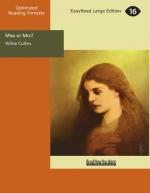“Not fond of him!” Natalie stopped, and clasped her hands in despair of finding language strong enough for the occasion. At the same moment the sound of a closing gate caught her ear. She looked round. Launce had kept his appointment before his time. Launce was in the garden, rapidly approaching them.
“Now for the Law of Clandestine Marriage!” said Lady Winwood. “Mr. Linzie, we will take it sitting.” She led the way to one of the benches in the garden, and placed Launce between Natalie and herself. “Well, Chief Conspirator, have you got the License? No? Does it cost too much? Can I lend you the money?”
“It costs perjury, Lady Winwood, in my case,” said Launce. “Natalie is not of age. I can only get a License by taking my oath that I marry her with her father’s consent.” He turned piteously to Natalie. “I couldn’t very well do that,” he said, in the tone of a man who feels bound to make an apology, “could I?” Natalie shuddered; Lady Winwood shrugged her shoulders.
“In your place a woman wouldn’t have hesitated,” her ladyship remarked. “But men are so selfish. Well! I suppose there is some other way?”
“Yes, there is another way,” said Launce. “But there is a horrid condition attached to it—”
“Something worse than perjury, Mr. Linzie? Murder?”
“I’ll tell you directly, Lady Winwood. The marriage comes first. The condition follows. There is only one chance for us. We must be married by banns.”
“Banns!” cried Natalie. “Why, banns are publicly proclaimed in church!”
“They needn’t be proclaimed in your church, you goose,” said Lady Winwood. “And, even if they were, nobody would be the wiser. You may trust implicitly, my dear, in the elocution of an English clergyman!”
“That’s just what my friend said,” cried Launce. “’Take a lodging near a large parish church, in a remote part of London’—(this is my friend’s advice)—’go to the clerk, tell him you want to be married by banns, and say you belong to that parish. As for the lady, in your place I should simplify it. I should say she belonged to the parish too. Give an address, and have some one there to answer questions. How is the clerk to know? He isn’t likely to be over-anxious about it—his fee is eighteen-pence. The clerk makes his profit out of you, after you are married. The same rule applies to the parson. He will have your names supplied to him on a strip of paper, with dozens of other names; and he will read them out all together in one inarticulate jumble in church. You will stand at the altar when your time comes, with Brown and Jones, Nokes and Styles, Jack and Gill. All that you will have to do is, to take care that your young lady doesn’t fall to Jack, and you to Gill, by mistake—and there you are, married by banns.’ My friend’s opinion, stated in his own words.”
Natalie sighed, and wrung her hands in her lap. “We shall never get through it,” she said, despondingly.




